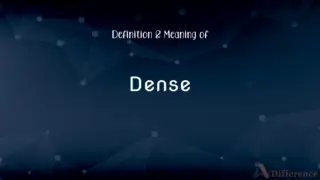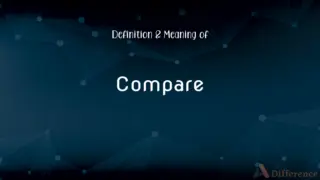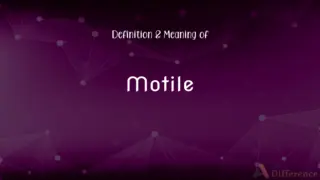Distrust vs. Mistrust — What's the Difference?
By Urooj Arif & Maham Liaqat — Updated on April 24, 2024
Distrust is a general sense of doubt about someone's honesty or reliability, often based on experience or reliable information; mistrust, while similar, is usually based on a lack of confidence without substantial evidence.

Difference Between Distrust and Mistrust
Table of Contents
ADVERTISEMENT
Key Differences
Distrust is often the result of negative experiences or consistent evidence that indicates someone is not reliable or honest. On the other hand, mistrust is typically less concrete, stemming from a feeling or intuition rather than direct evidence.
While distrust can be seen as a stronger, more reasoned response to specific behaviors or historical interactions, mistrust might be considered an initial, perhaps less rational reaction. Distrust is the culmination of ongoing doubts, whereas mistrust can be the starting point of uncertainty.
Distrust is often associated with a deliberate decision to withhold trust because of perceived untrustworthiness or deceitful past actions. In contrast, mistrust may arise spontaneously, even in the absence of overt reasons or past experiences.
In relationships, once distrust sets in, it can be challenging to overcome, as it is built on firm reasons and repeated validations of doubt. Mistrust, however, might be resolved more readily if new information comes to light or if positive interactions begin to outweigh initial hesitations.
In communication, expressing distrust typically implies a well-founded and specific lack of faith in someone's actions or character, grounded in rational assessment. Meanwhile, expressing mistrust could reflect a personal hesitance or insecurity, possibly without substantial justification.
ADVERTISEMENT
Comparison Chart
Basis
Negative experiences or consistent evidence
Lack of confidence, often without solid evidence
Strength
Stronger, more reasoned
Often initial, less rational
Resolution
Hard to overcome due to strong reasoning
Easier to overcome if contradicted by new positive experiences
Impact on Relations
Long-lasting, difficult to repair
May not heavily impact if addressed early
Communication
Indicates a rational, specific disbelief
Indicates general hesitance or caution
Compare with Definitions
Distrust
A protective stance against expected deceit.
He approached the negotiations with distrust, remembering past breaches.
Mistrust
Reluctance to accept without questioning.
Mistrust in new technologies can slow their adoption.
Distrust
A confirmed suspicion about someone’s reliability.
His repeated lateness bred distrust among his team.
Mistrust
A preventative caution in new relationships.
Mistrust is natural when dealing with unknown online sellers.
Distrust
A reaction to proven dishonesty or failure.
Distrust in the media has risen due to numerous inaccuracies.
Mistrust
Emotional hesitance to fully believe or confide.
His secretive behavior fostered mistrust among his friends.
Distrust
Established doubt based on past experiences.
She felt distrust toward the company after the scandal.
Mistrust
An initial suspicion without solid evidence.
She felt a wave of mistrust when meeting the overly enthusiastic salesman.
Distrust
Long-standing skepticism about motives or truth.
Distrust of politicians is common due to conflicting interests.
Mistrust
General unease about someone's intentions.
Mistrust often arises from a lack of transparency in transactions.
Distrust
Distrust is a formal way of not trusting any one party too much in a situation of grave risk or deep doubt. It is commonly expressed in civics as a division or balance of powers, or in politics as means of validating treaty terms.
Mistrust
Be suspicious of; have no confidence in
She had no cause to mistrust him
Distrust
The feeling that someone or something cannot be relied upon
The public's distrust of politicians
Mistrust
Lack of trust; suspicion
The public mistrust of government
Distrust
Doubt the honesty or reliability of; regard with suspicion
Speculation remained that the Army distrusted the peace process
Mistrust
Lack of trust or confidence
I viewed the stranger's advice with mistrust.
Distrust
Lack of trust or confidence
Listened to the sales pitch with distrust.
Mistrust
To regard without trust or confidence
He mistrusted his lieutenant.
Distrust
To have no confidence in; doubt or suspect
I distrust his claims to expertise.
Mistrust
To doubt the truth or sincerity of
I mistrust everything he says.
Distrust
Lack of trust or confidence.
Mistrust
Lack of trust or confidence; distrust, untrust.
Distrust
To put no trust in; to have no confidence in.
Mistrust
(transitive) To have no confidence in (something or someone).
Distrust
To feel absence of trust in; not to confide in or rely upon; to deem of questionable sufficiency or reality; to doubt; to be suspicious of; to mistrust.
Not distrusting my health.
To distrust the justice of your cause.
He that requireth the oath doth distrust that other.
Of all afraid,Distrusting all, a wise, suspicious maid.
Mistrust
(transitive) To be wary, suspicious or doubtful of (something or someone).
Distrust
Doubt of sufficiency, reality, or sincerity; lack of confidence, faith, or reliance; as, distrust of one's power, authority, will, purposes, schemes, etc.
Mistrust
(transitive) To suspect, to imagine or suppose (something) to be the case.
Distrust
Suspicion of evil designs.
Alienation and distrust . . . are the growth of false principles.
Mistrust
(intransitive) To be suspicious.
Distrust
State of being suspected; loss of trust.
Mistrust
Want of confidence or trust; suspicion; distrust.
Distrust
Doubt about someone's honesty
Mistrust
To regard with jealousy or suspicion; to suspect; to doubt the integrity of; to distrust.
I will never mistrust my wife again.
Distrust
The trait of not trusting others
Mistrust
To forebode as near, or likely to occur; to surmise.
By a divine instinct, men's minds mistrustEnsuing dangers.
Distrust
Regard as untrustworthy; regard with suspicion; have no faith or confidence in
Mistrust
Doubt about someone's honesty
Mistrust
The trait of not trusting others
Mistrust
Regard as untrustworthy; regard with suspicion; have no faith or confidence in
Common Curiosities
Can distrust be resolved?
Yes, but it is typically more challenging because it is based on firm, often repeated evidence of untrustworthiness.
What is the main difference between distrust and mistrust?
The main difference lies in their basis: distrust is usually based on substantial negative experiences or reliable information, whereas mistrust often stems from a lack of confidence without clear evidence.
Can someone feel both distrust and mistrust towards the same person?
Yes, someone can start with mistrust due to initial hesitations and develop distrust if their suspicions are later confirmed by experiences.
Is mistrust always a negative reaction?
Not necessarily; mistrust can be a natural protective mechanism in uncertain situations and may serve as a cautious approach.
How can one overcome mistrust in a relationship?
Overcoming mistrust generally involves building trust through consistent positive interactions and transparent communication.
How do distrust and mistrust affect relationships?
Both can negatively affect relationships, but distrust, being based on stronger evidence, can cause more long-lasting damage.
What are common causes of distrust?
Common causes include repeated dishonesty, inconsistency in words and actions, and past betrayals.
How should one address feelings of mistrust in professional settings?
In professional settings, it is important to address feelings of mistrust by seeking clarity, ensuring transparency, and fostering open communication.
What are some strategies to rebuild trust after distrust is established?
Rebuilding trust involves consistent behavior, accountability, open communication, and sometimes professional mediation.
Are there situations where mistrust is beneficial?
Yes, mistrust can be beneficial as a cautious approach when dealing with unknown or potentially risky situations.
What role does communication play in resolving mistrust?
Effective communication is crucial in clarifying misunderstandings and building a foundation for trust, thus resolving mistrust.
Is mistrust more prevalent in certain types of relationships than others?
Mistrust is more common in relationships where there is less history or knowledge about each other, such as new business partnerships or online interactions.
What psychological impacts can long-term distrust have?
Long-term distrust can lead to stress, anxiety, and a general reduction in the quality of interpersonal relationships.
Can cultural differences influence levels of distrust or mistrust?
Yes, cultural backgrounds can influence perceptions and expectations, thereby affecting levels of distrust or mistrust among individuals.
How does one differentiate between rational and irrational distrust?
Rational distrust is based on logical reasoning and evidence, while irrational distrust may stem from unfounded fears or prejudices.
Share Your Discovery

Previous Comparison
Tedious vs. Tiresome
Next Comparison
Alliteration vs. AssonanceAuthor Spotlight
Written by
Urooj ArifUrooj is a skilled content writer at Ask Difference, known for her exceptional ability to simplify complex topics into engaging and informative content. With a passion for research and a flair for clear, concise writing, she consistently delivers articles that resonate with our diverse audience.
Co-written by
Maham Liaqat













































